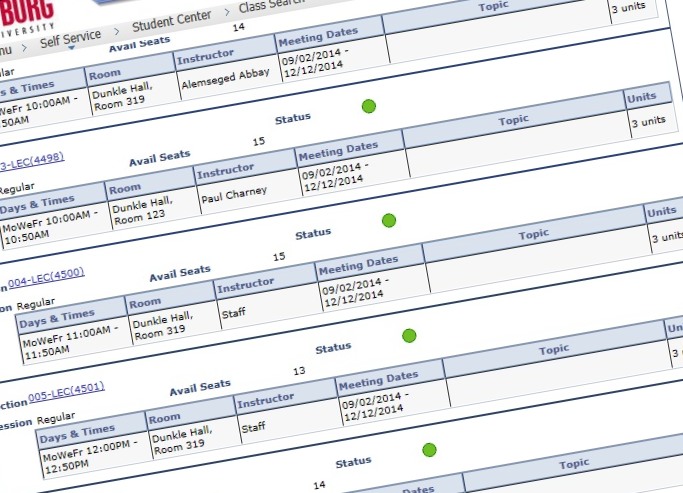Scheduling Can Be Tough, So Listen Up
As the end of the spring semester approaches, students who intend to return in the fall may begin to worry about their next semester’s schedules. For many students this is a stressful time. It can often be difficult to choose the classes that are needed versus the classes that just look fun and interesting. Even choosing the appropriate class times for classes can be a hassle.
At the end of each semester, this can become a recurring stress for returning students. For many, their advisors are their saviors who help direct them in the right way. Others may just jump in blind, hurting their chances of graduating on time. However, professors at Frostburg State University (FSU) have recently offered helpful advice for those students stressing about their future schedules.
Dr. Sally Boniece, history professor and program coordinator for the international studies department, believes a checklist is a great way for students to stay on track. Boniece provides students with a checklist of graduation requirements for the degree they seek. Dr. Boniece says, “I always ask students to hang on to these checklists and update them regularly as they fulfill their requirements.”
These checklists can be extremely helpful for students who are interested in keeping track of their own progress. This also allows students to plan their schedules ahead of time and allows for faster advising time. However, not only the international studies department offers these checklists. Many other department advisors have access to checklists to help students manage their own progress.
There are many ways FSU students can not only plan for their degree, but to also expand their experiential background. Dr. Amy Branam-Armiento, an associate professor in the English department, highly suggests students consider participating in the study abroad program available. She said, “[I urge you to] look at the courses that you have left to take in the GEP, as well as specific courses in your major and think about how easy it would be to find these classes in a study abroad program.”
The study abroad program on campus offers students opportunities to not only finish their degrees through cooperative programs, but to also travel to another country and learn about other cultures such as England, Ireland, Israel, Australia, China and many others.
It is also very important for students to try balancing their schedules each semester. Dr. Gregory Wood, an assistant professor in the history department, recommends that students try to do this as much as possible. He suggests, “[You should choose] something from your major, your minor, the GEP, [and] maybe balance courses that are humanities, social science, and STEM. Having a balanced schedule can help prevent boredom.”
Branam-Armiento agrees that it is important to balance schedules. However, she advises students to consider another way of scheduling their classes. She says, “I also think students will have the most fulfilling experience in their undergraduate careers if they do their best to match the course level to their year in school.”
Students should also not wait until the last minute to visit their advisors before scheduling classes. Dr. Paul Charney, chair of the history department suggests, “[Students should] schedule advising early and go to the advisor with courses they plan to take next semester. That would facilitate advising.”
Student accounts opened for the summer and fall 2014 semester registration on March 31. Students can access the Summer and Fall catalogs through the FSU website, as well as the online PAWS website.
Students who do not intend to return to campus in the Fall are asked to speak to the registrar’s office during finals week to officially withdraw.




